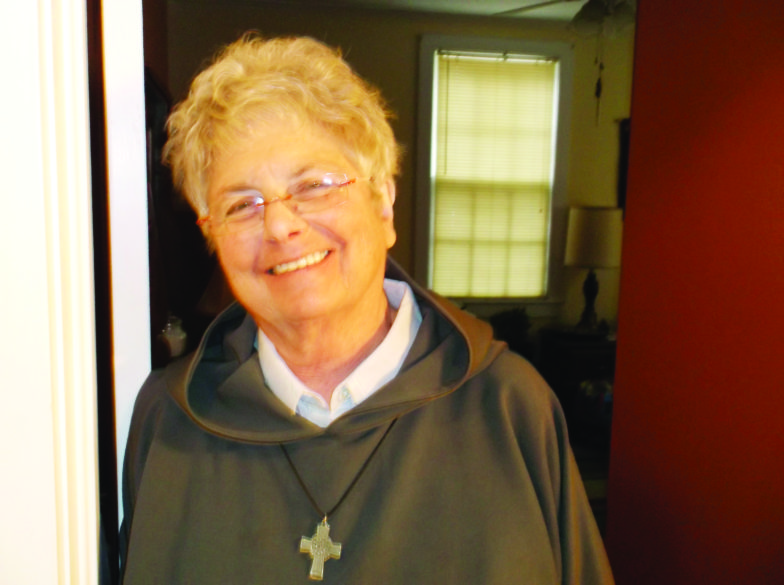From the hermitage
By sister alies therese
In a couple of weeks, Advent will offer us a joyous opportunity to enter more deeply into a new evaluation of our broken, busted, banished, bold and brought together lives in beatitude. Beatitude, however, will be hidden if we bang into barriers set to disrupt us; barriers we keep in place to protect ourselves, or so we blindly imagine.
G.K. Chesterton wrote somewhere in What’s Wrong With the World? that: We’re all in the same boat … we’re all seasick. I dare say Advent is a bit like taking a new look at the boat (my life, the church, and/or our world), and perhaps consume some Dramamine for the seasickness in the form of prayer, almsgiving and fasting. We shall also be looking for the beatitude of the coming of Jesus, though you may also discover Him asleep in your boat.
Usually during Advent, I need to clear out my excuses, and I have many, part of my seasickness. Whatever they are and in whatever form they appear … they need to go, or the promised beatitude might be obscured. I found this anonymous little excuse from a driver on his insurance claim: the pedestrian had no idea which direction to go, so I ran over him. Oh my, quite an excuse. Made me think of all the ways I just push on when I clearly might have stopped and waited until the pedestrian (be that people, ideas, prayer or issues) found their place. No need to run right over in the pursuit of beatitude. Unlikely to emerge. Excuses need to go so I can wait in peace … not in fear. Then I will know what to do. We know what Jesus said when He arose in the boat … where is your faith? Be not afraid. No need for excuses. And the sea was calmed. What beatitude Jesus bestows in Himself.

The Catechism offers us this little definition of beatitude: “Happiness or blessedness, especially the eternal happiness of heaven, which is described as the vision of God, or entering into God’s rest by those whom God makes ‘partakers of the divine nature.’” (CCC 1024, 1721)
Do reread this a couple of times because therein lies the very good news of the arrival of Jesus, Divine Beatitude. I am always reminded when I find these immense realities a bit overwhelming that Jesus was gracious enough, thoughtful enough, and wise enough to come as a little Child … a small baby, a little fella who would need to be fed and watered, comforted and rocked, enjoyed and played with, taught and accompanied on His journey of self-discovery and vocation. Who is afraid of a little child? The beatitude of humility.
Jesus’ ministry takes the time to convince us that our final beatitude will be to see God face-to-face. Really? That sounds a bit overpowering. Fortunately, Jesus will make that transformative experience a blessing beyond all blessings. No barriers, no excuses, nothing to separate us from God. Nothing. Forever. First, however we must learn the ways of beatitude and be ready to pray and act as if we belong. That’s what we are doing here until we move on. Thus, it is no secret that Matthew or Luke’s teachings from Jesus’ Sermon on the Mount are referred to as ‘The Beatitudes’ … the happinesses … the blessings … the promises, the actions and attitudes of the Christian life. (CCC 1716) When we explore our weaknesses and discover our gifts we are beginning to walk in the way of beatitude. When we discover our selfishness and the tiny Child … we are beginning a deeper journey into the humility of God. Remember though that ‘crash and burn’ is not the way to get there as our driver pointed out: When I could not avoid the collision, I stepped on the gas and crashed into the other car. Excuses must go even ones as simple as this: Sally won’t be in school a week from Friday. We must attend her funeral. Who knew?
Thus, in this season of plenty let us not only be thankful for all things, but really be thankful for all things. That challenge of gratitude will lead us to an attitude of receptivity, opening our hearts to the beatitude to come, filling us with what we need to make truthful and healthy decisions.
“The beatitude we are promised confronts us with decisive moral choices. It invites us to purify our hearts of bad instincts and to seek the love of God above all else. It teaches that true happiness is not found in riches or well-being, in human fame or power, or in any human achievement — however beneficial it may be — such as science, technology, and art or indeed in any creature, but in God alone, the source of every good and of all love.” (CCC 1723)
(Sister alies therese is a canonically vowed hermit with days formed around prayer and writing.)
